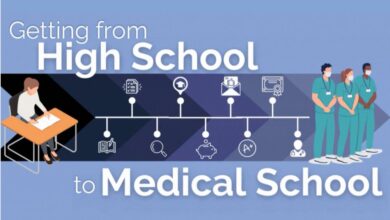As a premed, you may get advice from various sources. But how do you know what is true or not? Previously, we listed and debunked our first 11 premed myths. Here is a list of 11 more.
If you haven’t Premed Myths Part 1 yet, please do so before reading part 2.
*The facts stated below are specifically meant for U.S. allopathic medical schools
Myth 12: I need to finish all my pre-requisite classes before I take the MCAT.
Fact: Although it does help to have all your pre-requisite classes done before you take the MCAT, you can still do well on the MCAT without having completed those courses. The college courses will tend to teach much more than what you will need to know on the MCAT. You can master the MCAT material by using MCAT study books.
Myth 13: I’m at a very prestigious university so it’s fine if my GPA/MCAT is a little lower.
Fact: It is probably more impressive if you have a 3.8 from an Ivy League school versus a 3.8 at a community college, but a good GPA is a good GPA regardless of where you go. And a 3.0 at Harvard is still a 3.0. A MCAT score of 25 from a Harvard undergrad is still a 25. You might have a little more of a GPA cushion if you attend a prestigious school, but it is not significant. Your undergraduate reputation does not mean that much when it comes to medical school admissions, at least not enough to make up for a poor GPA or MCAT.
Myth 14: As long as I have a high GPA and MCAT, I will get accepted into medical school.
Fact: Having a competitive GPA and MCAT is the bare minimum for medical school acceptance. Medical schools do not simply want students who can get good grades or score well on exams. They are also looking for students who display the following 6 core components:
1. The diligence and intellectual capacity to succeed in an intense medical school curriculum and board examinations.
2. An understanding of the physician’s role in healthcare and physician-patient relationship.
3. The ability to communicate effectively and compassionately.
4. Good moral character.
5. An understanding of hypothesis-driven research.
6. Ability to lead and innovate.
Myth 15: I should take the minimum number of units necessary so that I can focus on fewer classes to get a higher GPA.
Fact: It is actually wise not too take too many units at once especially since it is difficult for admissions committees to tell on the AMCAS (the medical school application form) which classes were taken together. Nonetheless, if an applicant has not completed very many units and has a good GPA but does not have the MCAT score to back it up, this may be a red flag. Taking fewer courses at once suggests to the admissions committee that the applicant cannot handle difficult workloads. It is smart to refrain from taking too many classes that you will not be able to handle. Nevertheless, admissions committees like applicants who can succeed in difficult circumstances. You must find the right balance for yourself.
Myth 16: Getting good grades is more important than having a social life.
Fact: Many premeds unconsciously live their lives as if this was true. Unfortunately there are people who value getting into medical school above everything else and are thus willing to do anything to get there. Do not be one of those premeds. Do not neglect your social life to spend all your time studying, volunteering, or doing research. Your happiness should not depend on the grades you get in a class. Your success should not determine your self worth. Becoming a doctor is important, but it isn’t everything.
Myth 17: I shouldn’t help other premeds because we are technically competing.
Fact: Altruism is a core value in medicine. One person failing does not guarantee your success. Even at a technical level, it isn’t very likely that the premed that you help will ruin your class curve or take your spot in medical school. Studying with others makes studying more enjoyable and teaching others is one of the best ways to learn for yourself. In the bigger picture, medicine actually requires much cooperation with others. Having a cutthroat competitive mentality usually will often lead to failure rather than success.
Myth 18: I shouldn’t take any hard classes even if they interest me because I shouldn’t risk lowering my GPA.
Fact: This concern is understandable but you shouldn’t be afraid to take a class just because of the risk of a bad grade. College is a time to expand your knowledge and explore things you are interested in. Also, if you are genuinely fascinated about a subject, you will have extra motivation to study. Ultimately, taking a variety of classes might help you become a more well-rounded individual, making you more attractive to medical schools.
Myth 19: I do not need to do any extracurricular activities beyond volunteering at a hospital/clinic.
Fact: Most competitive applicants have multiple quality extracurricular activities under their belt and volunteering is only one of them. Simply being a volunteer is not enough. Pursue research, shadowing, non-medical volunteering, clubs, interest groups, etc. Don’t have the mentality of doing the bare minimum.
Myth 20: I won’t be able to put any of my non-medical related extracurricular activities on my medical school application.
Fact: You can put almost every type of extracurricular activity on your medical school application. Having non-medical activities on your application is actually beneficial because it shows that you have interests outside of medicine.
Myth 21: I have to dedicate my whole college career to premed activities. There is little time for me to pursue other interests outside of medicine.
Fact: You should pursue what you are passionate about in college. Your future career as a doctor is not everything. If you are passionate about something, make time for it and pursue it. Having different experiences outside of medicine can help you grow overall as a person and will even make you a better applicant.
Myth 22: If I don’t major in science, I’ll stand out more to admissions committees.
Fact: Being a non-science major does not automatically give you an advantage over a science major. In the application process, you must tell a story of who you are and your major is one part of that story. So if you can connect your non-science major to who you are as a person and as a future doctor, then that will help the admissions committee get to know you better.
Read: Premed Myths Part 3



